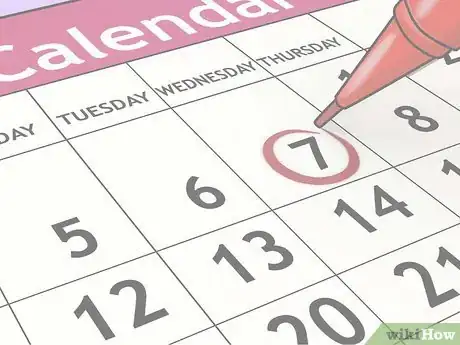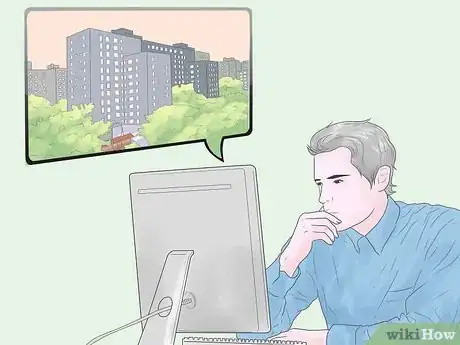This article was co-authored by Amber Rosenberg, PCC. Amber Rosenberg is a Professional Life Coach, Career Coach, and Executive Coach based in the San Francisco Bay Area. As the owner of Pacific Life Coach, she has 20+ years of coaching experience and a background in corporations, tech companies, and nonprofits. Amber trained with the Coaches Training Institute and is a member of the International Coaching Federation (ICF).
wikiHow marks an article as reader-approved once it receives enough positive feedback. This article received 14 testimonials and 100% of readers who voted found it helpful, earning it our reader-approved status.
This article has been viewed 167,949 times.
A conference is a great way for people with a common interest to get together and exchange the most cutting-edge ideas in their field. Conferences are regular occurrences in academia, many industry fields, multi-level marketing groups, and religious groups, to name a few. If you have decided to organize a conference in your area, you might be starting to realize that a well-planned conference has a to-do list about a mile long. There is the conference venue, participant list, materials, technology and even refreshments to think about and plan. If you are beginning to regret stepping up to plan, slow down, take a breath and know that you have the skills to organize a conference. The key to successful conference planning is to take each task one step at a time, and keep a thorough list of what you've done and what you need to do next.
Steps
Planning the Conference: Early Stages
-
1Start early. You should begin early stages of planning the conference at least eight months in advance, even longer if the conference will have many participants or is large in scope.[1]
- Remember, many venues and catering services must be reserved months in advance, and many participants will have to travel and make scheduling arrangements to be present.
- Furthermore, you might need sponsors and large companies prepare their annual budgets months in advance so any financial or non financial help has to be negotiated with them in advance.
-
2Form a committee. A conference committee makes all the decisions for the conference, and having more than one person ensures that you have enough perspectives to make decisions on important issues and that you have enough people to actually pull off the details.
- You'll need a conference coordinator who's the point person for all the major decisions and who will end up giving the most time to pulling everything together.[2]
- You can also hire an event planner if you have a big enough budget, and spare yourself the headache.
- If you're planning an annual conference, invite the previous year's coordinator to the committee, or at least ask for any materials from the previous year to help streamline planning.
Advertisement -
3Write down your goals and agenda. You will need to clearly define what you hope to accomplish with this conference because this will shape the rest of your decisions. Knowing what you want to convey and to who before you begin any other conference organizing eases the stress of moving forward.[3]
-
4Choose the city and the dates. Although you may not be able to choose the specific date and location without more planning, it's important that you have a good idea of how much time you have to plan.
- Find out what the industry norms are in your area before deciding on a date. For instance, in Europe conferences are usually held between March and June or September and November.
- Similarly, conferences tend to be held from Thursday to Friday or Monday to Tuesday.[6]
- The length depends on what all needs to be accomplished at a conference. For a conference of 250-300 people, plan for about two full days.[7]
- In general, it's easiest to organize a conference in your own city, and the city needs to have access to a nearby airport, hotels, and an acceptable choice of venues.
- It's best if the city is an area that people would want to visit anyhow to attract people who are on the fence about attending.[8]
-
5Name the conference. This will help when you begin publicizing, but also helps in planning since you can keep your materials consistent and start building a social media presence for the conference.
- Choose a name that hints at the goal and/or audience of the conference itself.
- Look up names of similar conferences to get ideas, but be sure yours doesn't sound too similar to another event, especially one related to your niche.[9]
Organizing the Conference
-
1Develop your budget. There is no way that you can do anything else without knowing how much money you have to spend overall, and then breaking that down into allocations such as conference venue, materials and speakers' fees. Stick to your budget, and if you delegate responsibilities, make sure your assistants are adhering to their monetary limits as well.[10]
- Make sure your budget and pricing model reflect a healthy ROI.[11]
- Consider recruiting sponsors for your event. Sponsors pay a fee to support the conference but also get a say in the content of the conference itself.
- If you have a sponsorship, your sponsors will typically host presentations or panels with their own speakers, and they may brand conference materials with their logos.
- Sponsors might include local industry leaders or philanthropists, depending on your topic.[12]
-
2Establish ticket price and method of sales. Some conferences are free to participants, and others charge exorbitant fees. There are several factors to consider when setting the ticket price and determining how to begin selling tickets:
- If it is a small, local conference with little or no fees, it might make sense to not charge people for attending.
- Another option is to allow people who present to attend free, while others pay a small fee to cover conference costs.
- Multi-day conferences or those that serve meals typically charge registration fees, which can vary from $30 to several hundred in the United States.[13]
- Many conferences use a sliding pay scale for people in different stages of their careers. For example, academic conferences typically charge a lower fee for students than for faculty.
- You might also charge a lower fee for members of the sponsoring association than for the general public.
-
3Choose your conference venue.[14] When scouting locations, keep in mind the number of participants, the convenience of the location, parking and proximity to public transportation, airports and hotels. Your goal in finding a place to hold the conference should be making it as easy as possible for participants to attend.
- Check out whether your city has a convention center or hotel with convention rooms. For small conferences, you can often rent a local church or community center.
-
4Enlist the help of venue staff. If you have chosen a venue that is known for holding conferences, then tap into this invaluable resource. This is what the staff does every day and should be able to answer any questions or concern and provide advice when needed.
- Some venues will provide an event planner who can handle many of the remaining details of your conference.
- Even if the planner charges a fee, it may be worth it to prevent this from becoming your own full-time job for the next few weeks.
-
5Decide on a menu. When you organize a conference, you need to remember that participants will not want to sit all day without eating a decent meal, and many won't know what is available in the area. Figure out if you will be hiring a catering service to bring in breakfast, lunch and snacks or if the conference venue you have chosen will provide food service.
- Keep in mind that attendees may have dietary restrictions, allergies, and preferences that can make planning meals rather difficult.
- If you choose an experienced caterer, they can create options for vegetarian, nut-free, gluten-free, kosher, or other meal preferences.
-
6Insist on a walk-through. After you have gotten through the bulk of your conference organizing, don't leave anything to chance by walking in with the rest of the participants when the conference is set to begin.
- Go to the conference venue and meet with the staff the day before to be certain that everything is in place and to take care of any last minute details.
Planning the Contents of the Conference
-
1Plan the schedule. You already know the title of the conference and have a general idea of the topics. But now you have to decide how it will actually play out. Conferences come in many types, and different industries take different approaches. If you are unsure how to proceed, consider going with a common conference format:
- Begin with a keynote or opening address. This is usually given someone well-known in the industry. The rest of the conference should be divided into shorter sessions.
- The actual content of sessions is usually determined by who is planning to attend (participants will submit proposals).
- You can also plan for workshops, film screenings, or other formats that you know you want to include.
- Depending on how many people are attending, you can have one session at a time (called "plenary") or several sessions running concurrently (called "breakout groups").[15]
- End the conference on a high note, with a motivational speaker or a challenge to the audience.
-
2Decide what type of sessions to have. These will vary depending on industry standards, but you might consider lectures, works-in-progress presentations, workshops, policy updates or state-of-the-field addresses, interactive sessions, or open-floor poster presentations.
- The type of sessions you expect to have will influence how you publicize the conference, so decide early what type of content will be most meaningful to your target audience.
- Sessions can range from 45 minutes to three hours each, depending on the number of presentations and the content.[16]
-
3Plan if you need to include any other activities. Figuring out how to fit other important events into your conference schedule is vital for a successful event.
- You can also schedule time for organizational business such as business meetings or awards.
- You can include catered meals or ask attendees to bring a brown-bag meal. You can also take a break and let attendees get lunch at nearby establishments.
- If you charge a fee, people will generally expect you to provide at least one meal.
- Depending on your location, consider providing entertainment, like tours of the local area, a night at a comedy club, or a film or theater performance.
Publicizing the Conference
-
1Determine who will participate. There are many kinds of conferences, including academic, religious, and industry, and each of these types differs in types of participants.[17] You need to be sure there is enough interest in the segment you are targeting before proceeding with planning.
- If you're only targeting a small group, publicize the conference through emails and mentions in your newsletter or administrative meetings.
-
2Find industry leaders to participate. You need a big headliner or keynote speaker to help convince other people in the industry.[18]
- Once you have confirmation that big names in the field will participate, you can include this information in your conference materials, such as your calls for participants.
-
3Create a conference website. These days it is almost mandatory to have a digital presence for a successful conference.[19] Find an available URL that includes the conference name or a logical derivative of it, so that it will be easy to find. Include all the important information about the conference at the website, and be sure to list the URL on all print materials and advertisements related to the conference.
- Be sure to include the date, time, and address of the conference venue, and names of any prominent speakers.
- You can also include information about transportation, lodging, area attractions, and you can attach the conference schedule when it is available, if desired.
- Update the website with a link to register when you are ready to open up registration.
-
4Advertise.[20] Start early (up to a year in advance) so that presenters can begin submitting proposals for session ideas. Depending on the size of your conference and your target audience, your approach will differ. Keep in mind where members of your target audience get their information about this industry or group. These might include:[21]
- Social media, such as the sponsoring organization's Facebook page and Twitter feed[22]
- Listservs and e-mail contact lists
- Trade blogs, magazines, newsletters, or journals
- Posters, flyers, or other announcements sent to relevant groups, organizations, or businesses
-
5Solicit proposals. In your advertising materials, you should also include a "Call for Participants" or a "Call for Proposals" asking for individuals or groups to submit paper, panel, or workshop proposals.
- The length of the proposals depends on your industry. In academia, smaller conferences usually ask for an abstract of a few hundred words; larger conferences ask for entire manuscripts.
-
6Begin accepting registrations. It’s a good idea to have a way for participants to register before the conference, even months in advance, to give you an idea of how many people will show up.
- Set up a registration website that is linked to the conference website. You can also use a third-party host for online registration, like RegOnline.
- You can also allow participants to call or fax in their registrations if you have a way to process payment by credit card.
- If you don't want to take registrations online or over the phone, upload a registration form to your website, then have participants print it and mail it to you.
- To encourage early registration, offer a discounted rate for those who register a month or more in advance.
Expert Q&A
-
QuestionWhat is important when organizing a conference?
 Amber Rosenberg, PCCAmber Rosenberg is a Professional Life Coach, Career Coach, and Executive Coach based in the San Francisco Bay Area. As the owner of Pacific Life Coach, she has 20+ years of coaching experience and a background in corporations, tech companies, and nonprofits. Amber trained with the Coaches Training Institute and is a member of the International Coaching Federation (ICF).
Amber Rosenberg, PCCAmber Rosenberg is a Professional Life Coach, Career Coach, and Executive Coach based in the San Francisco Bay Area. As the owner of Pacific Life Coach, she has 20+ years of coaching experience and a background in corporations, tech companies, and nonprofits. Amber trained with the Coaches Training Institute and is a member of the International Coaching Federation (ICF).
Pacific Life Coach Delegation! Create teams and clearly delegate roles and responsibilities ahead of time.
Delegation! Create teams and clearly delegate roles and responsibilities ahead of time. -
QuestionHow do I set up a registration system for a conference?
 Community AnswerTry using popular sites like ShowClix or EventBrite. If it's a big conference use the latter; it offers a lot more statistics.
Community AnswerTry using popular sites like ShowClix or EventBrite. If it's a big conference use the latter; it offers a lot more statistics. -
QuestionWhat are the duties of a protocol officer at a conference?
 Community AnswerYou have to ensure the timing, especially if there is an important person coming in. You also handle the prize giving, specifically the escorting part, and in charge of organizing seats according to their respected positions.
Community AnswerYou have to ensure the timing, especially if there is an important person coming in. You also handle the prize giving, specifically the escorting part, and in charge of organizing seats according to their respected positions.
References
- ↑ http://www.quirksmode.org/coh/
- ↑ http://ctb.ku.edu/en/table-of-contents/structure/training-and-technical-assistance/conferences/main
- ↑ Amber Rosenberg, PCC. Pacific Life Coach. Expert Interview. 8 March 2022.
- ↑ http://www.quirksmode.org/coh/
- ↑ Amber Rosenberg, PCC. Pacific Life Coach. Expert Interview. 8 March 2022.
- ↑ http://www.quirksmode.org/coh/concept.html
- ↑ http://ctb.ku.edu/en/table-of-contents/structure/training-and-technical-assistance/conferences/main
- ↑ http://www.quirksmode.org/coh/concept.html
- ↑ http://www.quirksmode.org/coh/concept.html
- ↑ Amber Rosenberg, PCC. Pacific Life Coach. Expert Interview. 8 March 2022.
- ↑ Amber Rosenberg, PCC. Pacific Life Coach. Expert Interview. 8 March 2022.
- ↑ http://www.quirksmode.org/coh/concept.html
- ↑ http://www.quirksmode.org/coh/concept.html
- ↑ Amber Rosenberg, PCC. Pacific Life Coach. Expert Interview. 8 March 2022.
- ↑ http://www.quirksmode.org/coh/concept.html
- ↑ http://www.quirksmode.org/coh/concept.html
- ↑ Amber Rosenberg, PCC. Pacific Life Coach. Expert Interview. 8 March 2022.
- ↑ Amber Rosenberg, PCC. Pacific Life Coach. Expert Interview. 8 March 2022.
- ↑ Amber Rosenberg, PCC. Pacific Life Coach. Expert Interview. 8 March 2022.
- ↑ Amber Rosenberg, PCC. Pacific Life Coach. Expert Interview. 8 March 2022.
- ↑ http://ctb.ku.edu/en/table-of-contents/structure/training-and-technical-assistance/conferences/main
- ↑ Amber Rosenberg, PCC. Pacific Life Coach. Expert Interview. 8 March 2022.
About This Article
To organize a conference, first you'll need to choose a location and dates. When you're reserving a venue, go with something in close proximity to airports, public transportation, and hotels so it's convenient for your attendees. Next, come up with a schedule for your conference that includes the sessions you'll have and any special guests and activities. Then, you should establish ticket prices and come up with an easy way for people to buy them, like through an official website for your conference. To learn how to publicize a conference, scroll down!



















































































